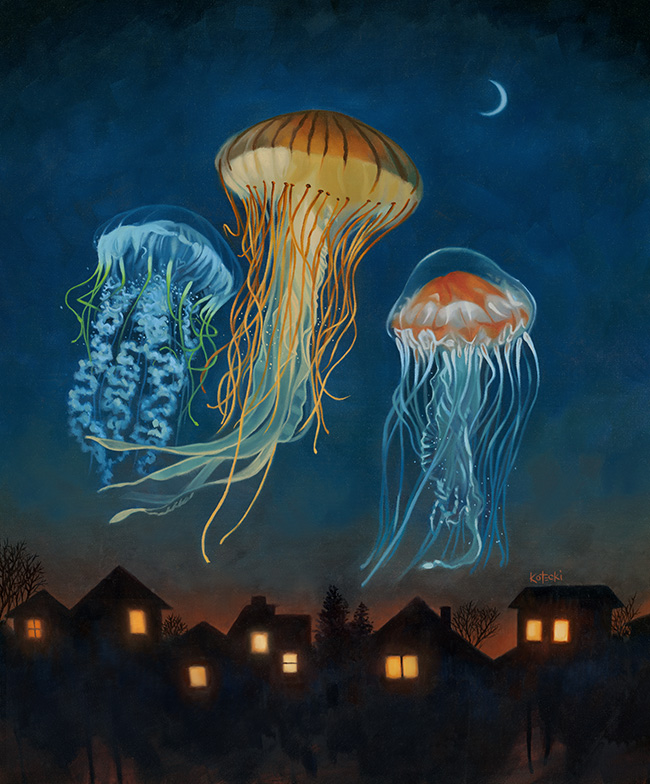A clear night sky is a thing of beauty, with millions of stars blinking silently overhead.
It’s a pity we rarely notice them.
In an episode of Curb Your Enthusiasm, Larry David is speaking with a receptionist at a law firm who has a spectacular view of the city behind her. “Beautiful view here! How long did it take you to take it for granted?”
She replies, “Umm, not long I guess.”

He candidly admits, “It would take me about a day. Maybe less. Maybe half an hour. And I would never look out the window again.”
How quickly we take wonder for granted.
This painting was inspired by a passage I read in the book The Sense of Wonder, by conservationist Rachel Carson, who wrote about a summer her grandnephew visited her cottage in Maine, and together they wandered the surrounding woods and tide pools.
She recounted a particular evening when they gazed in awe at one of those breathtaking night skies:
“It occurred to me that if this were a sight that could be seen only once in a century or even once in a human generation, this little headland would be thronged with spectators. But it can be seen many scores of nights in any year, and so the lights burned in the cottages, and the inhabitants probably gave not a thought to the beauty overhead; and because they could see it almost any night perhaps they will never see it.”
Because they could see it almost any night perhaps they will never see it.
This painting takes its inspiration from those lights burning in the cottages, with the inhabitants giving not a thought of the beauty overhead.
What if a party of giant glowing jellyfish appeared above your town and put on a light show? Surely that would get your attention.
But what if it happened every year? Every week? Every night? How long would it take before everyone stopped caring?
Not as long as you’d think.
Apollo 11 landed on the moon. It was a huge source of national pride. Half a billion people were glued to their television sets watching the historic achievement.
Nine months later—nine months!—flights to the moon had already become boring. By the time Apollo 13 came around, the television networks didn’t even bother covering the launch or broadcast the live video of the crew from space because they felt there wasn’t enough interest. Nobody wanted their soap operas or game shows interrupted by another group of heroes doing what most people had never done before. Only until Apollo 13 got in trouble did anyone care.
We grow numb to wonder.
Look around you. What are you taking for granted? What are you missing?
Be honest: When was the last time you gazed at the stars?
Stood in awe at a sunrise bursting forth color on the horizon?
Sat in silence amidst the peace of a placid snowfall?
I don’t know about you, but I am disgusted by this propensity to grow numb to wonder.
But can we do anything about it?
Fortunately, Rachel Carson shows us a way:
“One way to open your eyes to unnoticed beauty is to ask yourself, ‘What if I had never seen this before? What if I knew I would never see it again?'”
One painting and two powerful questions remind us to keep our eyes peeled for the wonder all around us.
 I wonder…what is an example of wonder you’ve been privileged to witness recently?
I wonder…what is an example of wonder you’ve been privileged to witness recently?